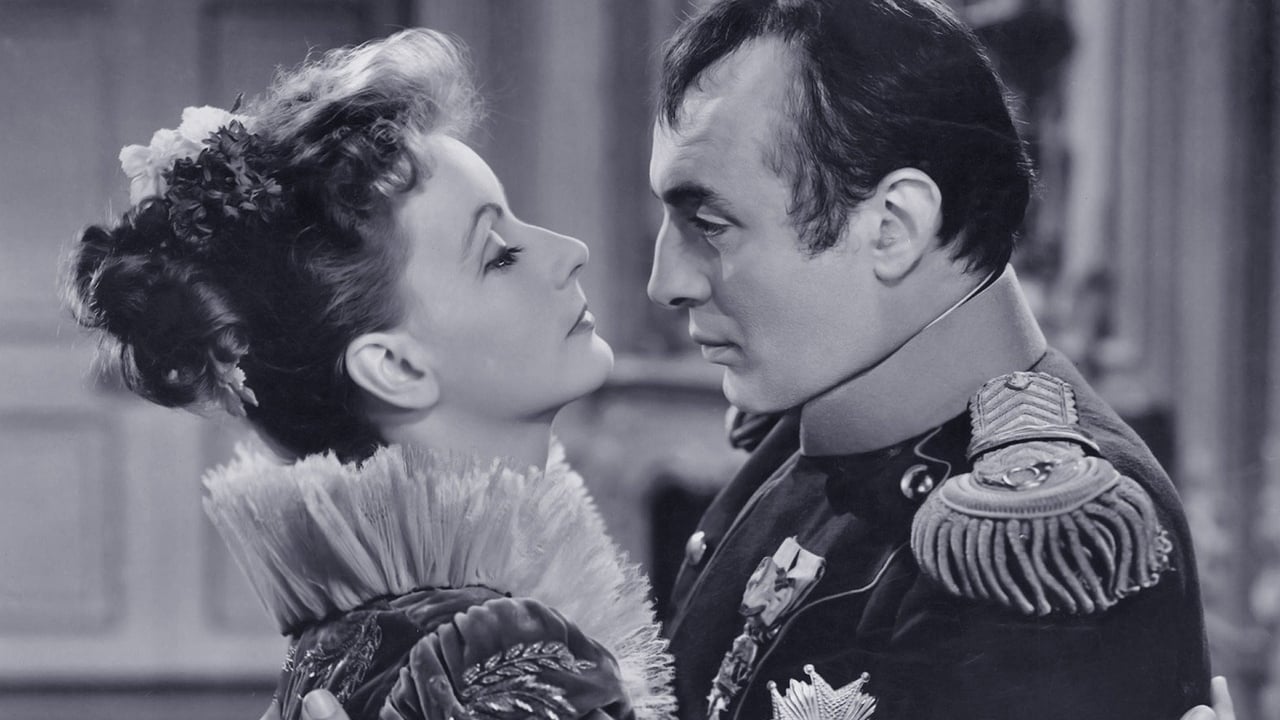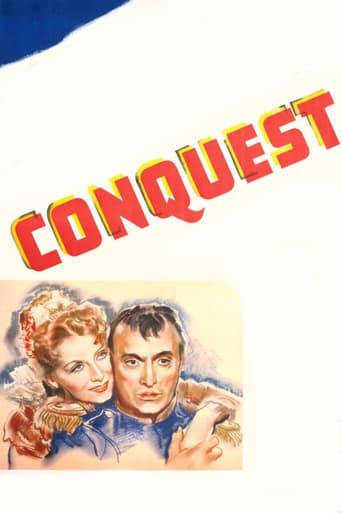

The greatest movie ever!
... View MoreSadly Over-hyped
... View MoreI cannot think of one single thing that I would change about this film. The acting is incomparable, the directing deft, and the writing poignantly brilliant.
... View MoreI wanted to like it more than I actually did... But much of the humor totally escaped me and I walked out only mildly impressed.
... View MoreThis frivolous epic may be novelettish at best but it is also sumptuous and highly entertaining and with Garbo and Boyer in the leads it couldn't be anything less. He's Napoleon, (and Oscar-nominated for his performance) and she's a Polish countess called Marie Walewska, (the film's alternative title), with a husband over twice her age, (the great Henry Stephenson). Initially she just admires Napoleon but then falls in love with him, leaving her husband and risking scandal and the movie works as a likeable if trite romance greatly helped, of course, by the chemistry between its stars, both of whom are outstanding. A splendid supporting cast and the kind of art direction that only money can buy also go to making this something of a treat.
... View MoreAs a classic film buff, age 57, I had never even heard of "Conquest," but now I have discovered this neglected masterpiece. Obviously, some viewers can't get the point of the film. If this sort of reaction was typical at the time of the film's release, and if audiences could not grasp Garbo's increasingly sophisticated choice of roles in "Ninotchka" and "Two-Faced Woman," the fact that she retired so early in her career becomes less of a mystery.Immediately after the Opening Credits, the text on the screen explains that this is the story of a love affair, not a historical dramatization.What is very surprising is that this affair began in a very striking way, which is never discussed, but rather ignored, or even distorted, in plot summaries. It presents an unflinching portrayal of loveless passion and loveless betrayal, and perhaps is too realistic to be welcome in a culture which glorifies the consummation of physical passion as an end in itself.Early in the picture, Garbo is an honorable married woman who has refused Napoleon's attentions and illicit overtures. She finally accepts a mission urged upon her by desperate Polish patriots, to use her feminine attractions as an inducement to prevail upon Napoleon to guarantee her country's independence. In a private audience with the Emperor, she declines the role of seductress and instead eloquently pleads her cause. But not only is her request ignored, but she is forced against her will to submit to him.All this is presented dramatically with great taste and subtlety, but the sober humiliation of her defeat is written all over Garbo's face at the beginning of the next scene. Stoically, she must then suffer even further as her older husband, robbed at once of his pride and the joy of his marriage, announces he will annul their union, and she will never see him again. There is a clear time lapse until her next meeting with the man who has ruined her life."Conquest" does not become a romance, there are no swelling chords in the film score, there are no breathless avowals of rapture in the film at all until Napoleon's exercise of power - naked, self-absorbed, egotistical power, in this case over a woman - is replaced by the finer feelings of a man who has recognized shamefacedly his own weakness and comes to value someone who can offer him both forgiveness and love.The tragedy of power, turning eventually in Napoleon's make-up into blind megalomania, brilliantly portrayed by Charles Boyer, is treated expertly in the second half of the movie, although some reviewers have criticized this section as boring and slow-moving. On this basis, mercilessly probing psychological dramas such as "Macbeth" and "King Lear" are also a waste of time.Napoleon sees, but does not see, the self-sacrificing courage of the young revolutionary who attempts to kill him. He sees, but does not see, Garbo's shocked disillusionment at his cold-blooded calculations for a royal marriage. He sees, but does not see, the final, heartsick, angry despair of a dying soldier on the doomed, frozen march from Russia.And he sees, but does not see, his adjutant's wide-eyed expression, bordering on accusation, as the ship carrying Garbo and her son plows through rough seas leaving Elba. Napoleon has cut short her visit of reconciliation to send her on an errand to his secret allies, knowing that the carrier of his previous message has been murdered.The bottom line of "Conquest" is that a deeply-abiding, human love relationship co-exists with human frailty, and it is transfigured by human loyalty. In the lives of two people who are truly committed to each other, these and other disparate elements are the hidden currents. The world only sees a couple from the outside. The genius of Clarence Brown's production, and that of any creative artist approaching this classic theme, is to reveal the mystery of all these complexities and many dimensions, with the utmost sensitivity and respect.This is one of those films which is worth several viewings. It is for grown-ups. It is a truly beautiful piece of work by all concerned.
... View More"Conquest" was an attempt by all departments to secure a hit Garbo's co-star was the romantic idol of the day, Charles Boyer; the subject was to have an epic sweep Napoleon's retreat from his disastrous Russian campaign, through Poland and Marie Walewska, on his inevitable way to Elba Garbo's role as his suffering, cast-off mistress, victim of high politics was a chance to touch the heartstrings It all failed, for reasons clearly laid out early on in the story when Marie tells an admonitory Emperor: 'Sire. You stand in the sun.' Garbo's fans saw no point in their idol standing in the shadows "Conquest" remains a measured, dignified, and often rather dull historical fiction, lightened by excellent performances and production
... View MoreWhat was Greta Garbo's greatest film? I suppose most people would opt for CAMILLE, ANNA KARENINA (the sound version), QUEEN Christina, or NINOTCHKA. But I feel that CONQUEST may be the only major film in her career that she ended up being dominated by her co-star. It isn't that she doesn't act, or that Clarence Brown (her favorite sound film director) did not do what he could to show her to advantage. It is that Charles Boyer is a very fine actor, and he is playing one of the leading figures of history. Boyer is Napoleon Bonaparte, and he is fantastically good in the role, showing the childlike hesitation and fascination with simple things that mingled with his military and political genius (and growing egomania). My favorite moment in the film is when Boyer first dances with Garbo, and his clumsiness is actually quite charming.Garbo could not compete with this character. Marie Walewski may have sacrificed all for her Poland (briefly Napoleon did create a Duchy of Warsaw out of fragments of the Poland that had been destroyed by Prussia, Austria, and Russia), but she did not do all that badly as the Emperor's mistress. She did not succeed Josephine as Empress (she could give no political advantage to Napoleon if they had married) but what advantage did Napoleon's second wife, Marie Theresa of Austria, get out of it - they married in 1809, had one sickly son (who died in 1831 as Duke of Reichstadt), and in 1815 the Emperor was defeated for the second and final time - her husband's empire was finally gone. So we are left looking at that fascinating man of destiny. He at least keeps our attention.One problem that I have with the film - Reginald Owen is very good as Talleyrand, but in 1815 (at the time of Waterloo) he was not an adviser of Napoleon. In fact, with Joseph Fouche, they were doing their best to undermine the Emperor's attempt to return to power. He certainly would not have supported the creation of a new grand army to confront the Bourbons and the Allies. Yet even with this error, I have to admit that one of my favorite moments in the film is when Napoleon, after a discussion of military strategy with Talleyrand, throws his pen down on the table on a map, and it ("miraculously") lands pointing on the portion of the map where Belgium is, at Waterloo. A corny bit of business, but quite well done.
... View More